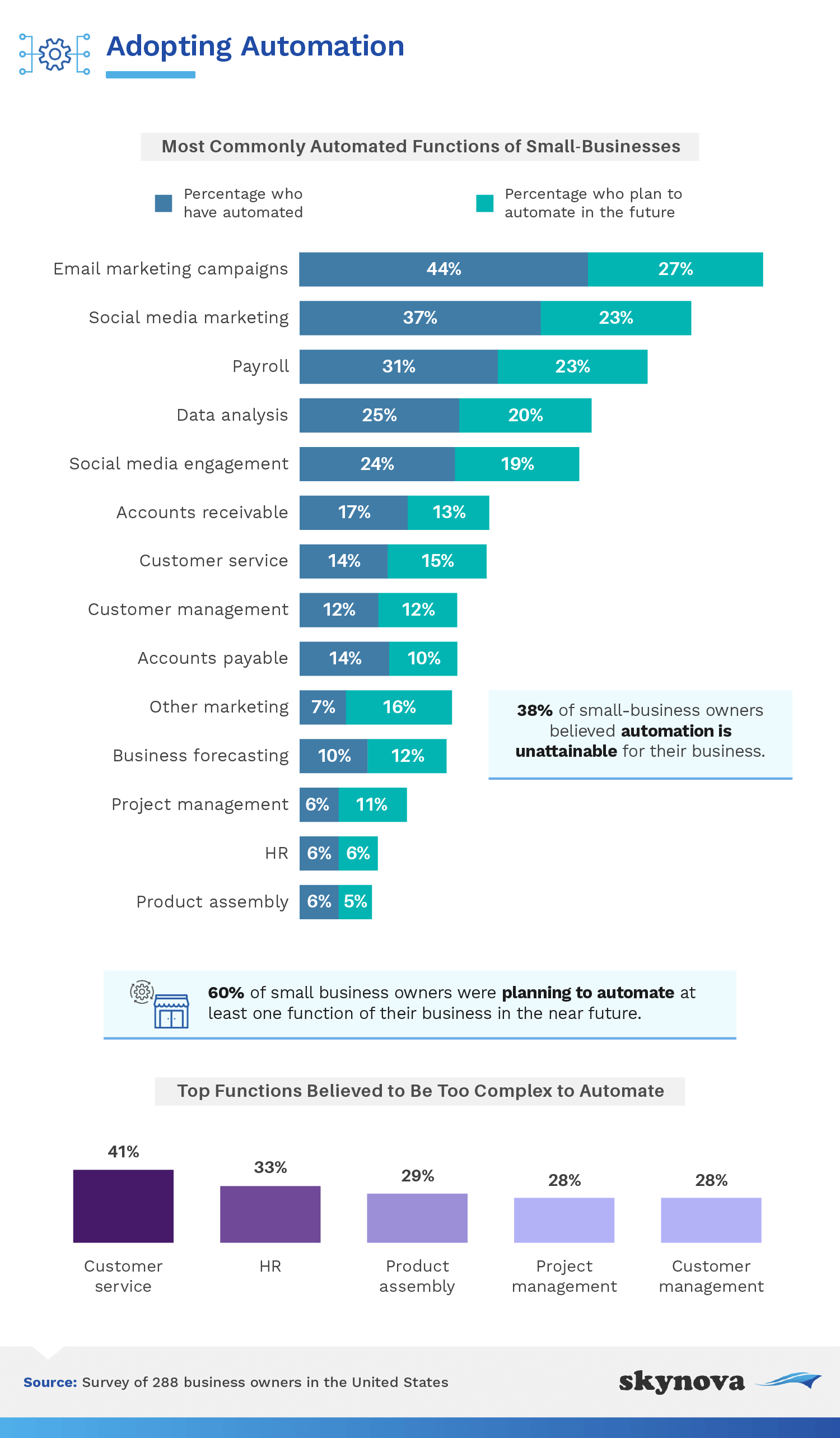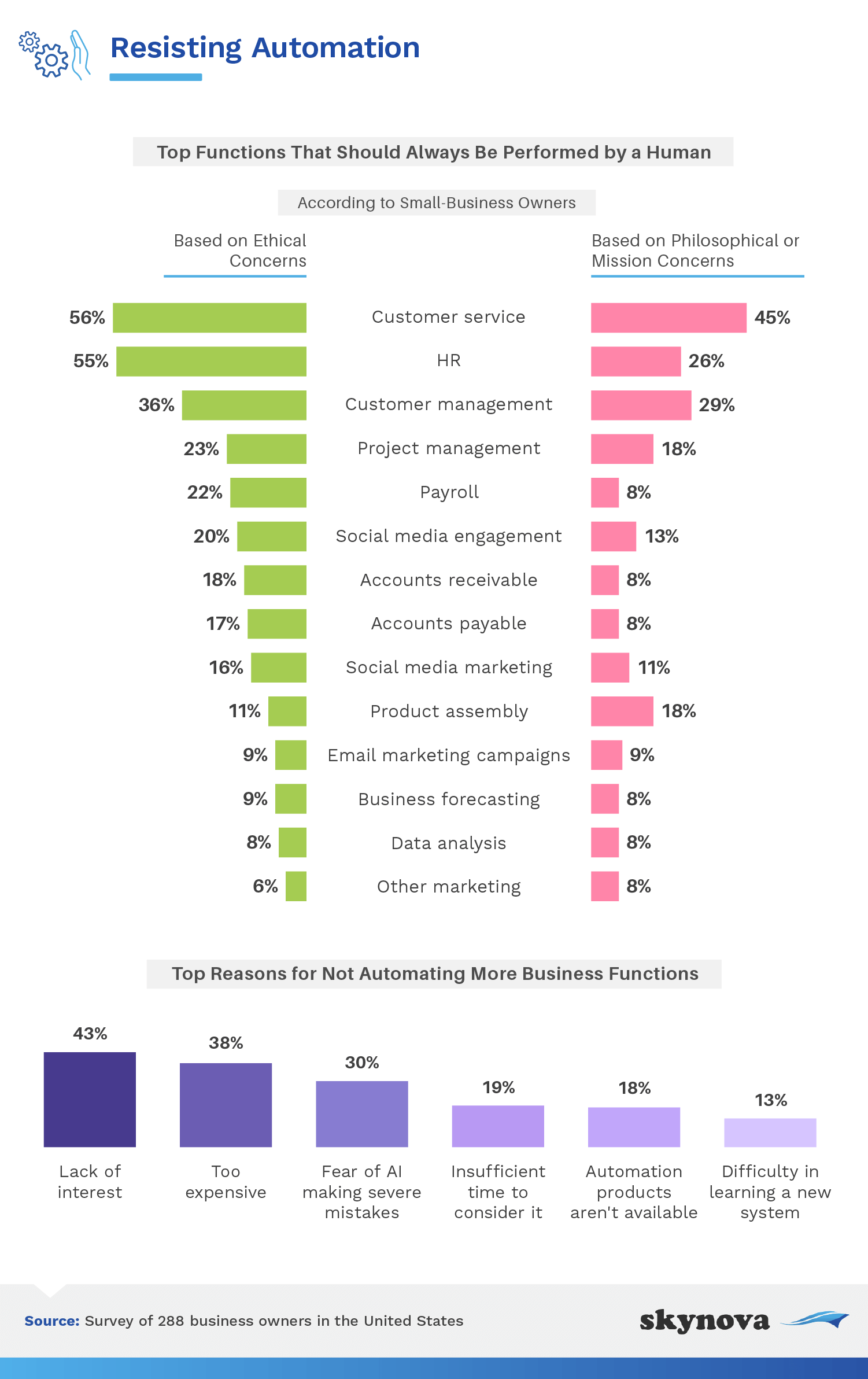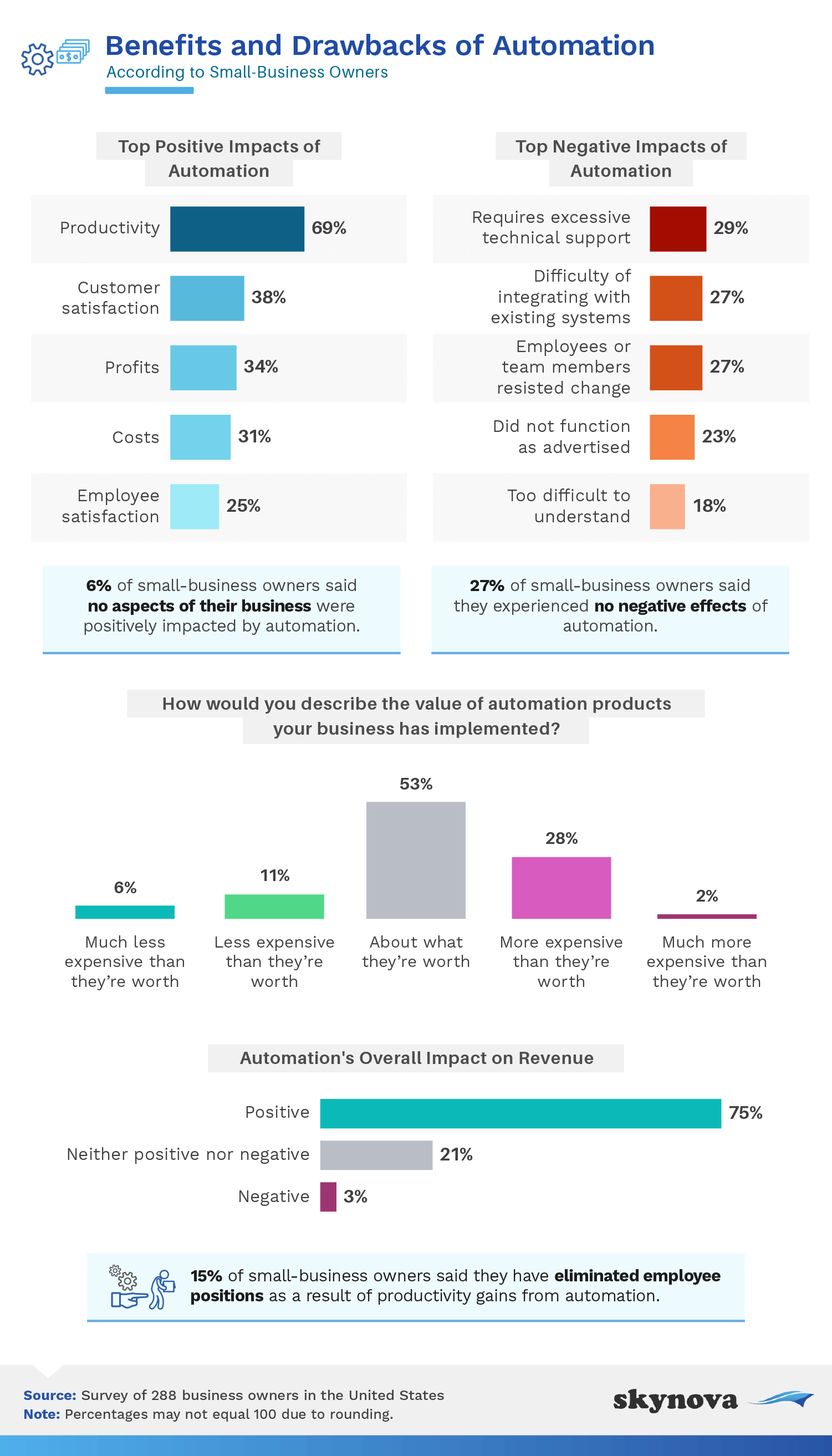
|
Sixty years ago, the idea of artificial intelligence and automation in the workplace was still a foreign and often misunderstood concept. During its early rise to prominence, many American employees viewed the incorporation of automation as an immediate replacement of their jobs and a total elimination of any human interaction. While we are aware that automation does not equate to robots kicking you out of your desk chair and taking over the world, its implementation still draws hesitancy from business owners and employees alike. If a small business is looking to incorporate automation, it is vital that the owners understand the full spectrum of positive and negative benefits.
To uncover more details on these topics, we surveyed 288 owners of American small businesses. We obtained data surrounding the specific functions of the business they are currently automating or plan to automate in the future; the aspects of the business they see as unfit or too complex for automation; and an overall pulse on both the positive and negative impacts of incorporating automation technology. This data will help to uncover how small-business owners feel about automation and its impact on their company.
Email marketing campaigns are the most commonly automated small-business function, with 44% of respondents currently automating this operation and 27% planning to automate it in the future. Social media marketing is the next most frequently automated function, with 37% of small businesses automating this practice and another 23% seeking to implement automation one day soon. Shown to reduce the potential for human error, support maximum working efficiency, and ultimately allow for employees to focus on more complex tasks, the benefits of introducing automation into marketing departments are both numerous and financially lucrative.

Conversely, HR ranks lowest on this list, with only 6% of small businesses currently automating the role. This likely stems from the notion that too much upfront training would be required or that automation would take away from human interaction. As many as 33% of small-business owners believed HR-related functions are simply too intricate to automate. Customer service is automated 14% of the time and exhibits a 15% outlook for future automation. Companies also considered customer service to be the most complex function, resulting in 41% of these employers deeming it unfeasible for automation.
Feeling uncomfortable with change, especially automation in the workplace, is a natural human reaction. Studies show that cultural resistance is the most significant barrier that employers must overcome when implementing any form of automation in their processes. According to our results, small-business owners experience this same level of discomfort.

Queried business owners noted ethical and philosophical concerns as some of the main drivers behind the decision not to automate customer service and HR functions. Approximately 56% of employers believed customer service should always be performed by a human based on ethical reasons, and 45% of employers felt the same way based on philosophical or company mission concerns. For whatever reason, 43% of owners reported being simply uninterested in automating any more business functions. Nevertheless, employers showed minimal concern about incorporating automation into miscellaneous marketing activities, with just 6% admitting resistance to this process.
Analyzing financial implications is important to the bottom line of any business. Small-business owners overwhelmingly reported productivity as the greatest benefit of automation, with 69% reporting it as a positive outcome. Customer satisfaction and profits were the next most positively impacted aspects with 38% and 34%, respectively. Technical difficulties served as the main culprits behind a negative experience, as 29% of business owners felt that automation required too much technical support, and 27% noted that automated aspects did not integrate seamlessly into existing systems.

Overall, a staggering 75% of small-business owners reported a positive impact on the company’s revenue stream as a result of implementing some form of automation. Seventy percent also described the value of automation to be greater or equal to the cost associated with it – meaning these companies were ultimately able to find worth in these products and processes. Equipped with the knowledge that automation drives up productivity and diversifies day-to-day responsibilities, smaller companies can confidently integrate this technology into their business model while justifying the associated financial costs.
Given that more than half of small businesses plan to implement new automation processes in the near future, it’s increasingly important that small-business owners turn a keen eye toward the benefits automation can have on productivity, customer satisfaction, and profits. Although the initial costs and cognitive overhead of implementing business process automation can be overwhelming for some small-business owners, 70% believed that the returns granted by automation products are greater than or equal to the cost, and 3 in 4 saw positive results in their revenue stream as a result of these automation products. For the American small-business owner, it’s often worth it to push through the technology barrier to reap the rewards waiting on the other side.
Skynova supports small businesses by supplying adaptive software modules including invoices, accounting, timesheets, and much more. Our team enjoys writing detailed articles about the topics that are most meaningful and impactful to our customers. These articles typically focus primarily on the workplace and include an insightful convergence with aspects that affect small businesses, including finance, technology, politics, sports, and health. The articles incorporate survey data, statistics, and research we conduct ourselves. We are confident that these data-supported articles will provide readers with a unique and insightful perspective as it relates to their business.
For this analysis, we surveyed 288 business owners in the United States with at least one employee. 58% of respondents were men, 41% of respondents were women, and 1% of respondents identified as nonbinary or noncomforming. Respondent ages ranged from 20 to 78 with an average of 38.2 years old. To help ensure that all respondents took our survey seriously, they were required to identify and correctly answer an attention-check question.
These data rely on self-reporting by the respondents and are only exploratory. Issues with self-reported responses include, but aren't limited to, the following: exaggeration, selective memory, telescoping, attribution, and bias. All values are based on estimation.
As either a consumer of a small business or the owner of one yourself, we encourage you to share the results of this study with others for noncommercial use. We only ask that you include a link back to this page to provide access to our entire analysis and methodology.